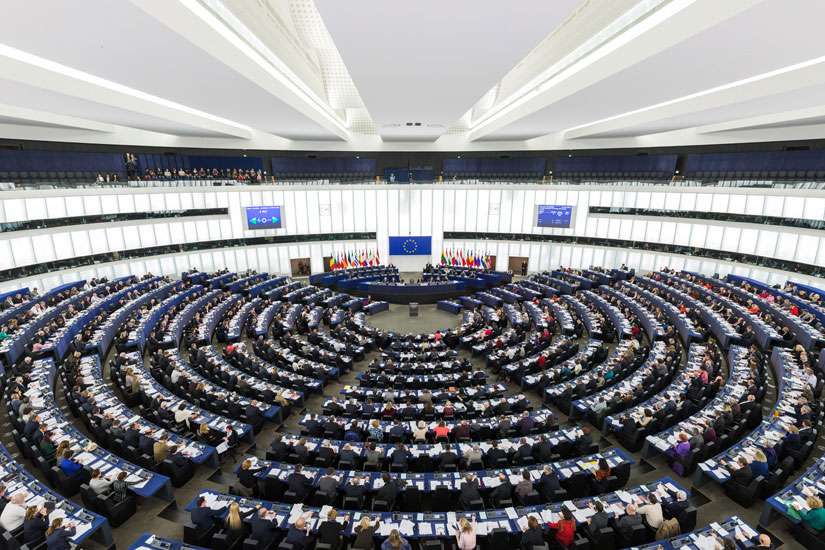"European integration is based on values rooted mainly in Christian inspiration and widely held as a universal ethos," the Brussels-based Commission of the Bishops' Conferences of the European Community, known as COMECE, said in a June 14 report.
"An authentic European peace policy based on values will help overcome divisions between member states that sometimes give preference to their particular national interests before the European and global common good," the report said.
The 29-page document said the Catholic Church had promoted peace for 2,000 years, and believed current threats from terrorism, organized crime, social injustice, military over-spending and "nationalistic tendencies" were not being "effectively addressed."
It said COMECE was offering "reflections for orientation" rather than "technical solutions or definite answers," but believed the best hope lay in "pre-emptive peace and the transformation of violent conflicts through justice."
"The security environment of the European Union has become increasingly unstable and volatile — the time has now come for the EU to live up to its vocation," continued the report, which was prepared by a 16-member international working group chaired by Archbishop Jean-Claude Hollerich of Luxembourg.
"However, as peace on Earth is not born out of structures but has to be sown by people — peacebuilding must start from the bottom and from afar. Thus it is everybody's task and responsibility to work for peace by combating resignation and overcoming indifference," the report said.
COMECE represents more than 1,000 Catholic bishops from the EU's 28 member states under a German president, Cardinal Reinhard Marx, and vice presidents from Belgium, Italy, Scandinavia and Lithuania. It supports closer European unity and enjoys access to senior EU officials, who are struggling with crises over the Euro currency, mass migration and Great Britain's possible withdrawal after a June 23 referendum.
Speaking June 14 in Brussels, Auxiliary Bishop Jean Kockerols of Belgium, a COMECE vice president, said the Church understood peace as a "dynamic process characterized by ceaseless efforts," and believed justice, human rights and "effective global governance" were essential to it.
"The Catholic Church with its worldwide networks and broad societal outreach, often in ecumenical co-operation, can make a unique contribution to the EU's peacebuilding mission," Kockerols said.
"We hope this report fosters debate with civil society and becomes a point of reference for the wider public," he added.
Jorg Luer, who heads of the German Church's Justice and Peace Commission and co-produced the report, said each national church had studied the EU's challenges, and "contributed its own perspectives" to the document.
He told Catholic News Service June 15 that the current crises had created a "greater sensitivity" among European politicians to advice from the Catholic Church, and to its "soft skills" in promoting "non-violence, healing and an appreciation of identities."
"In Germany, we had to rebuild relations with our neighbours after World War II and this experience can be helpful in other contexts, especially in fostering reconciliation and transitional justice. These things are very close now to the German way of thinking," Luer said.
"But the Church is a very big, wide space, and it would be surprising if there was a total consensus and some of this report didn't face resistance. We need to do more homework and deepen our own internal dialogue before we call on local dioceses and parishes to help implement our proposals."
The report was issued as a contribution to the EU's new "Global Strategy on Foreign and Security Policy," which is to be announced later in June.
It said the EU had "contributed importantly" to stability in the post-war Balkans and to resolving a crisis over Iran's nuclear program, while leading the fight against climate change, contributing more than half of all humanitarian aid in the region, and maintaining more than 30 peacekeeping missions in world trouble spots.
However, it cautioned that the EU was now surrounded by an "arc of instability" on its southern and eastern borders, because of war in Ukraine and "failing state structures" in the Middle East.
Among 21 policy recommendations, the report called for greater "coherence and consistency" in the EU's peace diplomacy, including early warning systems and mediation missions, the use of "policy instruments" to promote human rights and religious freedom, and accompanying steps to deter terrorism and foster disarmament and "fair and ethical trade schemes."
In a foreword, Marx said the EU's role in transforming Europe's political culture and economic life had created a precious "peace dividend," adding that the Catholic Church had always supported the EU's "aspirational pursuit of peace."


